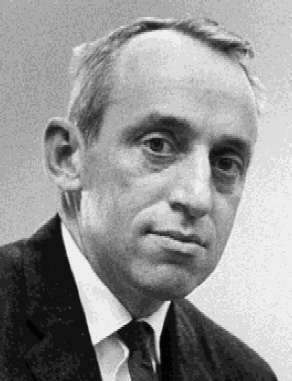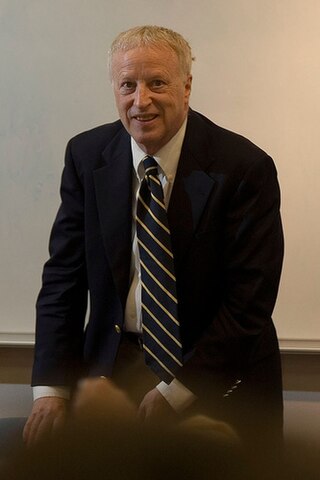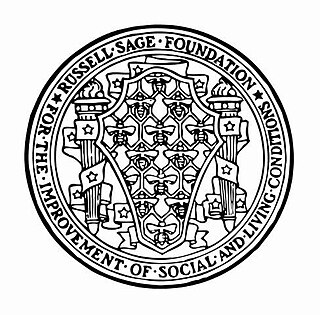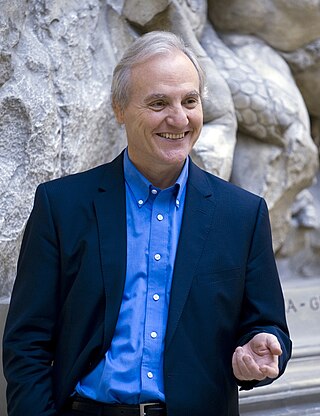
James Tobin was an American economist who served on the Council of Economic Advisers and consulted with the Board of Governors of the Federal Reserve System, and taught at Harvard and Yale Universities. He developed the ideas of Keynesian economics, and advocated government intervention to stabilize output and avoid recessions. His academic work included pioneering contributions to the study of investment, monetary and fiscal policy and financial markets. He also proposed an econometric model for censored dependent variables, the well-known tobit model.

Daniel Little McFadden is an American econometrician who shared the 2000 Nobel Memorial Prize in Economic Sciences with James Heckman. McFadden's share of the prize was "for his development of theory and methods for analyzing discrete choice". He is the Presidential Professor of Health Economics at the University of Southern California and Professor of the Graduate School at University of California, Berkeley.

Behavioral economics studies the effects of psychological, cognitive, emotional, cultural and social factors on the decisions of individuals or institutions, such as how those decisions vary from those implied by classical economic theory.

George Arthur Akerlof is an American economist and a university professor at the McCourt School of Public Policy at Georgetown University and Koshland Professor of Economics Emeritus at the University of California, Berkeley. Akerlof was awarded 2001 Nobel Memorial Prize in Economic Sciences, jointly with Michael Spence and Joseph Stiglitz, "for their analyses of markets with asymmetric information."
Neil Joseph Smelser (1930–2017) was an American sociologist who served as professor of sociology at the University of California, Berkeley. He was an active researcher from 1958 to 1994. His research was on collective behavior, sociological theory, economic sociology, sociology of education, social change, and comparative methods. Among many lifetime achievements, Smelser "laid the foundations for economic sociology."

David Edward Card is a Canadian-American labour economist and professor of economics at the University of California, Berkeley. He was awarded half of the 2021 Nobel Memorial Prize in Economic Sciences "for his empirical contributions to labour economics", with Joshua Angrist and Guido Imbens jointly awarded the other half.

The Russell Sage Foundation is an American non-profit organisation established by Margaret Olivia Sage in 1907 for “the improvement of social and living conditions in the United States.” It was named after her recently deceased husband, railroad executive Russell Sage. The foundation dedicates itself to strengthening the methods, data, and theoretical core of the social sciences in order to better understand societal problems and develop informed responses. It supports visiting scholars in residence and publishes books and a journal under its own imprint. It also funds researchers at other institutions and supports programs intended to develop new generations of social scientists. The foundation focuses on labor markets, immigration and ethnicity, and social inequality in the United States, as well as behavioral economics.

Ernst Fehr is an Austrian-Swiss behavioral economist and neuroeconomist and a Professor of Microeconomics and Experimental Economic Research, as well as the vice chairman of the Department of Economics at the University of Zürich, Switzerland. His research covers the areas of the evolution of human cooperation and sociality, in particular fairness, reciprocity and bounded rationality.
The MIT Department of Economics is a department of the Massachusetts Institute of Technology in Cambridge, Massachusetts.

Samuel Stebbins Bowles, is an American economist and Professor Emeritus at the University of Massachusetts Amherst, where he continues to teach courses on microeconomics and the theory of institutions. His work belongs to the neo-Marxian tradition of economic thought. However, his perspective on economics is eclectic and draws on various schools of thought, including what he and others refer to as post-Walrasian economics.

Herbert Gintis is an American economist, behavioral scientist, and educator known for his theoretical contributions to sociobiology, especially altruism, cooperation, epistemic game theory, gene-culture coevolution, efficiency wages, strong reciprocity, and human capital theory. Throughout his career, he has worked extensively with economist Samuel Bowles. Their landmark book, Schooling in Capitalist America, has had multiple editions in five languages since it was first published in 1976. Their most recent book, A Cooperative Species: Human Reciprocity and its Evolution was published by Princeton University Press in 2011.

Emmanuel Saez is a French, naturalized American economist who is Professor of Economics at the University of California, Berkeley. His work, done with Thomas Piketty and Gabriel Zucman, includes tracking the incomes of the poor, middle class and rich around the world. Their work shows that top earners in the United States have taken an increasingly larger share of overall income over the last three decades, with almost as much inequality as before the Great Depression. He recommends much higher (marginal) taxes on the rich, up to 70% or 90%. He received the John Bates Clark Medal in 2009, a MacArthur "Genius" Fellowship in 2010, and an honorary degree from Harvard University in 2019.
John Michael Van Reenen OBE is the Ronald Coase School Professor at the London School of Economics and the Gordon Y. Billiard Professor of Management and Economics at the Massachusetts Institute of Technology, where he is jointly appointed in the Department of Economics and the MIT Sloan School of Management. He is also an Associate in the Growth Research Programme at the Centre for Economic Performance. He was appointed an Officer of the Order of the British Empire (OBE) and received the Yrjö Jahnsson Award.

Nadarajan "Raj" Chetty is an Indian-born American economist and the William A. Ackman Professor of Public Economics at Harvard University. Some of Chetty's recent papers have studied equality of opportunity in the United States and the long-term impact of teachers on students' performance. Offered tenure at the age of 28, Chetty became one of the youngest tenured faculty in the history of Harvard's economics department. He is a recipient of the John Bates Clark Medal and a 2012 MacArthur Fellow. Currently, he is also an advisory editor of the Journal of Public Economics. In 2020, he was awarded the Infosys Prize in Economics, the highest monetary award recognizing achievements in science and research, in India.

Eldar Shafir is an American behavioral scientist, and the co-author of Scarcity: Why Having Too Little Means So Much. He is the Class of 1987 Professor in Behavioral Science and Public Policy; Professor of Psychology and Public Affairs at Princeton University Department of Psychology and the Princeton School of Public and International Affairs, and Inaugural Director of Princeton’s Kahneman-Treisman Center for Behavioral Science and Public Policy,.
Amy Nadya Finkelstein is a professor of economics at the Massachusetts Institute of Technology (MIT), the co-director and research associate of the Public Economics Program at the National Bureau of Economic Research, and the co-Scientific Director of J-PAL North America. She was awarded the 2012 John Bates Clark Medal for her contributions to economics. She was elected to the National Academy of Sciences and won a MacArthur "Genius" fellowship in 2018.
Duncan K. Foley is an American economist. He is the Leo Model Professor of Economics at the New School for Social Research and an External Professor at the Santa Fe Institute. Previously, he was Associate Professor of Economics at MIT and Stanford, and Professor of Economics at Columbia University. He has held visiting professorships at Woodrow Wilson School at Princeton University, UC Berkeley, and Dartmouth College, as well as the New School for Social Research.
Gary Charness is Professor of Economics and the Director of the Experimental and Behavioral Economics Laboratory in the Department of Economics at the University of California, Santa Barbara. Charness is an economist and social scientist, specializing in experimental and behavioral work; he is currently ranked 3rd in the world by RePEc in the field of experimental economics and has published nearly 80 academic articles. Charness is a contributor to several areas of economic research, including social preferences, identity and group membership, communication and beliefs, behavioral interventions, group decision-making, social networks, gender, and individual decision-making. A centerpiece of his research has been to effect beneficial social outcomes in difficult economic environments. Charness's work has been discussed and published in The New York Times and Science, as well as in other media. Charness is married and has three children.
Georg Heinrich von Weizsäcker is a German economist and currently the Professor for Microeconomic Theory and Applications at the Humboldt University of Berlin. His research interests include microeconomics, experimental economics, financial decision making, game theory and decision theory. In 2017, Weizsäcker's contributions to a better understanding of expectations formation and decisions under uncertainty were awarded the Gossen Prize.
Botond Kőszegi is an economist and a professor at Central European University.












